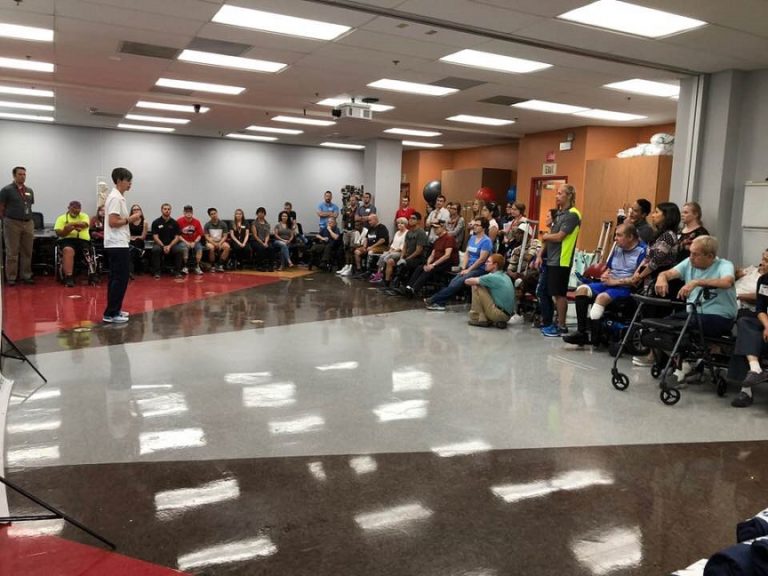The Orthotic & Prosthetic Activities Foundation
First Clinics
Introduction to First Clinics
OPAF offers a wide range of recreational activities for those with physical and mobility challenges. These first activities include tennis, swimming, scuba diving, dancing, golfing, and rock climbing. The experience provides a hands-on introduction to the activity itself, taught by experienced athletes provided by OPAF, in a safe and secure environment with their peers.
The First Clinic is not only an incredible and empowering experience for participants and caregivers, it’s also an investment in the hands-on training of practitioners and therapists.

First Things First
This continuing education module is designed for physical therapists, occupational therapists, and other allied health practitioners. The goal of the course is to demonstrate basic mobility skills required for safety in the limb loss population. First Things First reviews epidemiology related to the limb loss population and evidence-based intervention programs related to fall prevention. We demonstrate practical techniques to help the individual mitigate the force of a fall and get up from the floor after a fall. First Things First is our most introductory course teaching patients, caregivers, and practitioners how to build confidence in basic mobility while reducing risk of falls. The format includes a classroom lecture and a practical portion to allow for hands-on participation. At the completion of the course, rehabilitation professionals will be able to directly apply these skills into daily practice and participants will leave with renewed confidence in their fundamental mobility.
First Fit
This continuing education module is designed for physical therapists, occupational therapists, and other allied health practitioners. The goal of the course is to teach rehabilitation professionals about physical fitness specific to the limb loss population. First Fit incorporates topics that include prosthetic componentry, K-levels, health and safety concerns, and physical exercises for the limb loss population. The course also reviews outcome measures that may assist the practitioner in determining readiness for exercise. The format includes a live-interaction lecture portion containing evidence-based information, and a practical portion to allow for hands-on participation. Attendees will work through a variety of strength and mobility activities as well as review safety awareness and fitness tips to apply to their everyday life. At the completion of the course, rehabilitation professionals will be able to directly apply these skills into daily practice.
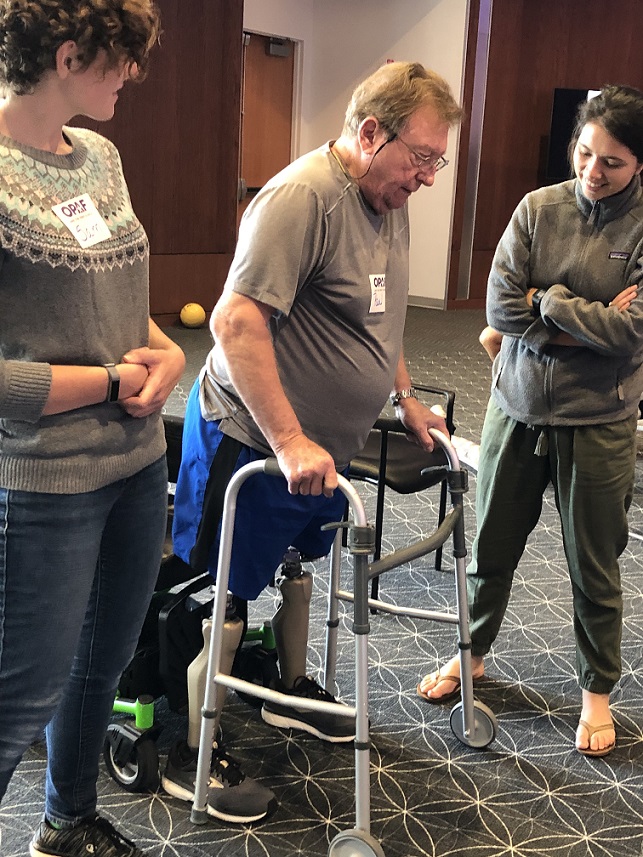
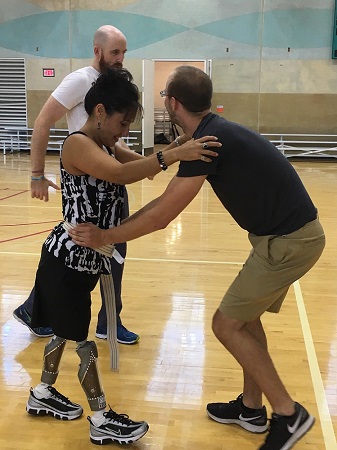
First Stride
This continuing education course is designed for physical therapists, physical therapist assistants, and other allied health practitioners. The goal of the course is to teach rehabilitation professionals the skills to appropriately integrate prosthetic technology into gait training. First Stride reviews core elements of prosthetic gait, including a review of normal human locomotion, prosthetic gait deviations, and interventions. Lecture content also reviews challenges of the individual with lower limb amputation, manufacturer’s guidelines on prosthetic componentry and alignment, pre-gait therapeutic techniques, and gait training with a prosthesis. A hands-on lab session follows the lecture, which includes individuals with amputations. Rehabilitation professionals will leave with the ability to immediately apply this information to their daily practice.
First Dance
First Dance is designed for those with mobility impairments, their loved ones, and allied health professionals to learn the fundamental skills of dancing. First Dance opens participants to a new social environment, allowing them to engage in a fun activity while practicing dynamic balance skills. Dancing occurs in multiple planes of motion and requires instances of single-stance activity. First Dance is a partner based clinic and demonstrates particular foot work involved in various styles of dance. The partner assisted activity allows participants to have a stronger sense of stability while practicing dynamic movements. First Dance is instructed by professional dance instructors and offers a variety of dance styles. Those of all ages and all physical capabilities can participate in this social program to enjoy social dance.
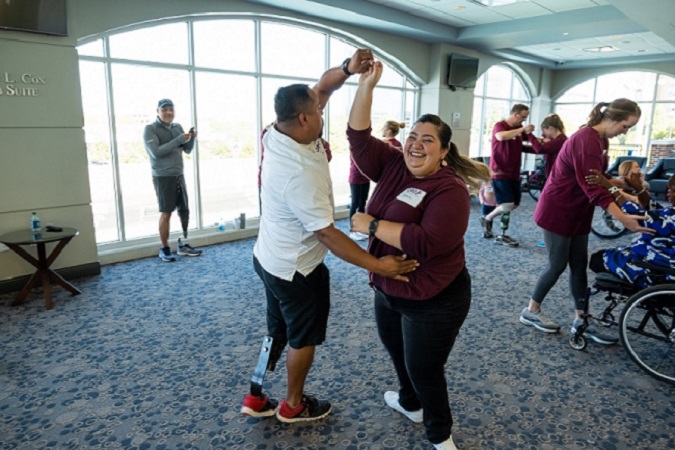
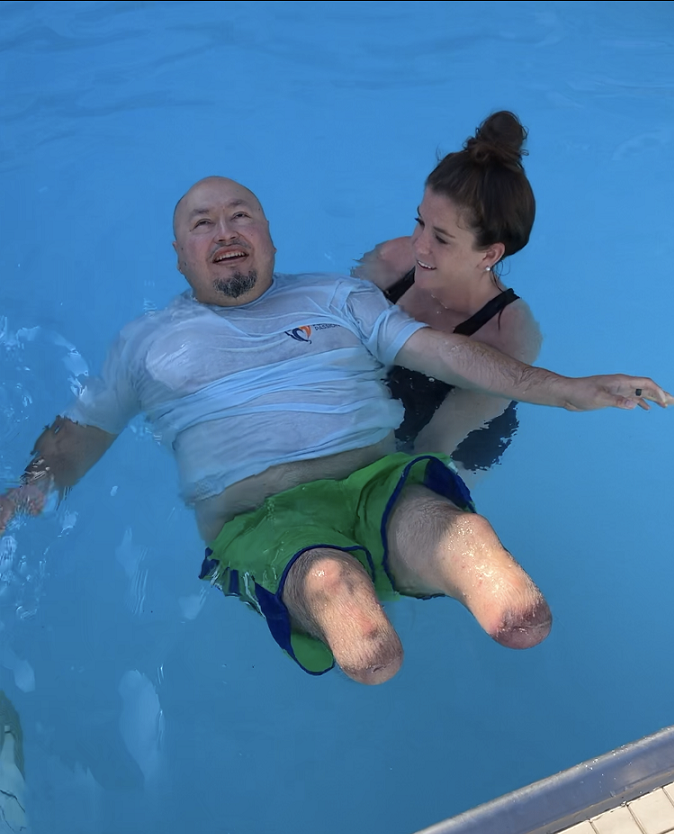
First Swim
This continuing education module is designed for physical therapists, occupational therapists, and other allied health practitioners. The goal of the course is to teach healthcare professionals how to appropriately apply swimming as an exercise modality and reviews pool safety, transfers, and prosthetic limb management around the water.
First Swim also reviews basic elements of swim strokes and the compensations often required for individuals with limb loss. The goal of this course is to familiarize the therapist with the knowledge and resources necessary to keep this patient population active. Upon completion of the course, rehabilitation professionals will have the ability to immediately apply this information to their daily practice.
First Swing
First Swing is a program brought to you by The National Amputee Golf Association (NAGA) and was developed and perfected by Bob Wilson, a bilateral transtibial amputee, and former NAGA Executive Director, since passed. NAGA is currently led by Executive Director Tracy Ramin. The program was designed to instruct therapists to teach and encourage the disabled to learn, or re-learn the game of golf. Each course is taught and led under the supervision of NAGA instructors. First Swing introduces those with mobility deficits proper stance and stroke techniques for various shots and, if necessary, how to safely utilize adaptive equipment to play. First Swing provides a controlled environment where participants can learn techniques for proper weight shifting, a key element to a consistent swing. First Swing challenges participants’ balance, stability, coordination, and strength and encourages participants to get outside for a social outing.
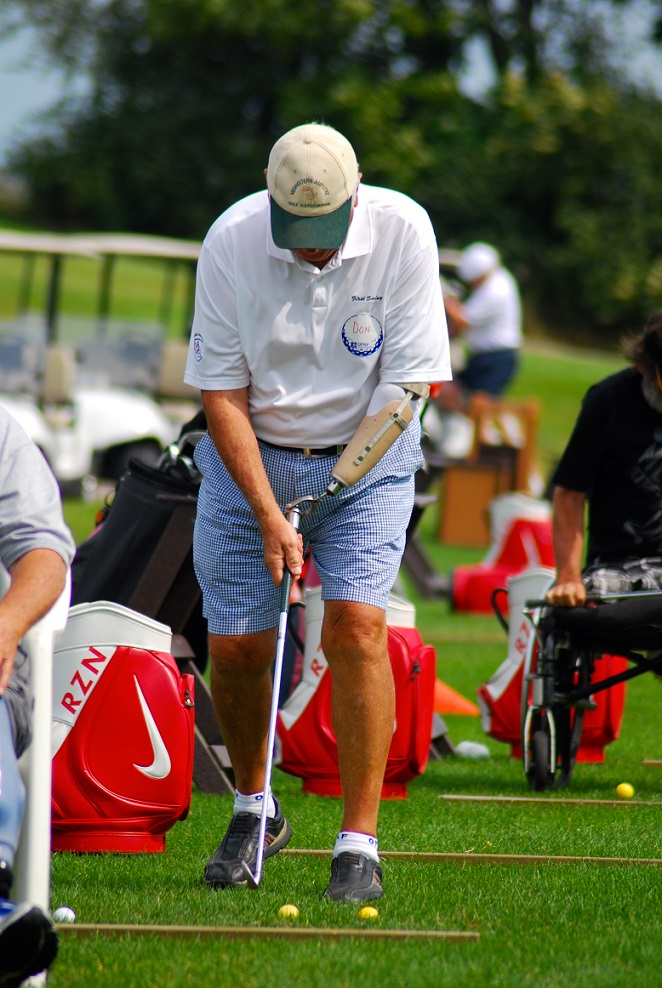
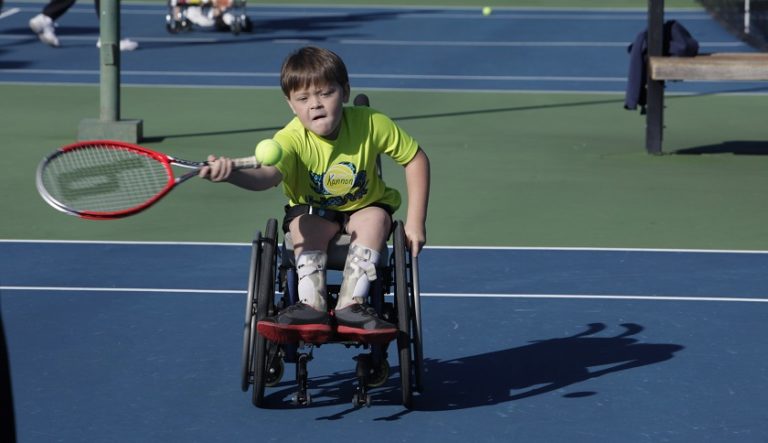
First Volley
First Volley is designed for those with mobility deficits who wish to enjoy the game of tennis, but choose not to sit in a wheelchair to do so. Unlike traditional wheelchair tennis, First Volley aims to teach ambulatory players the skills and drills required to compete. Participants will learn adaptive tennis techniques for forehands, backhands, volleys, and serves as well as the necessary footwork required for a return. Participants will be introduced to adaptive equipment and rules of adaptive tennis. Each clinic can be catered to all abilities to ensure participants have success – those who use a wheelchair as their primary means of mobility are encouraged to participate!
First Dive
First Dive is designed for those with mobility deficits who wish to enjoy the thrill of SCUBA diving. First Dive provides fundamental SCUBA diving skills and instructions required to safely experience freedom of movement in the water. Instruction is provided from Adaptive Scuba Divers and buddies and all equipment is provided. First Dive introduces the emotional and physical benefits of SCUBA diving as participants move freely in a zero gravity environment.
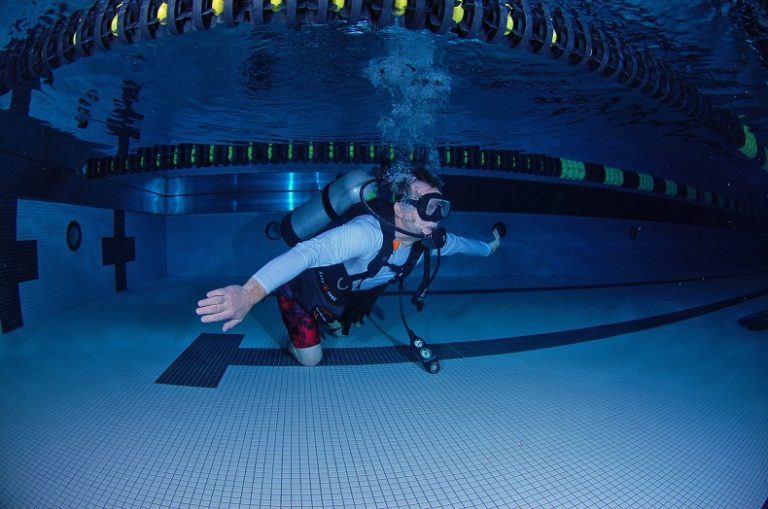
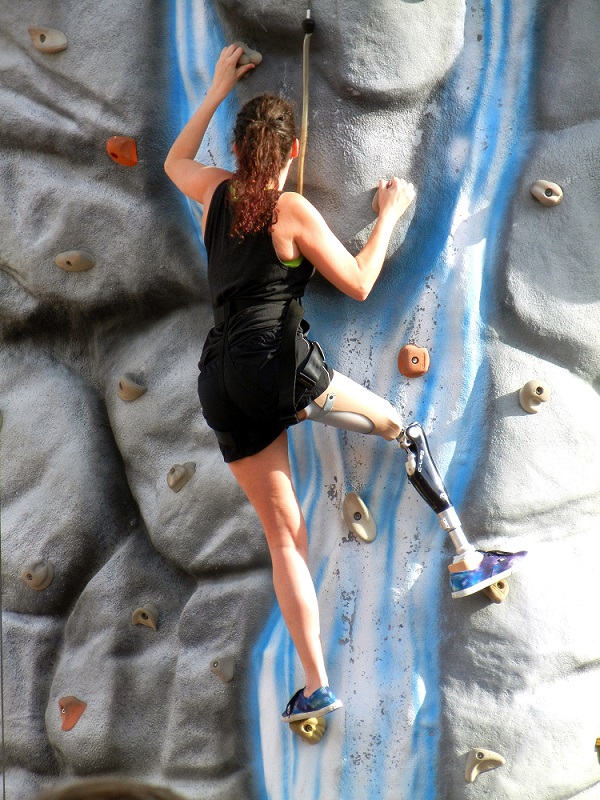
First Climb
First Climb introduces those facing physical or mobility challenges to the thrill of adaptive rock climbing or paraclimbing. First Climb provides specific adaptive training and belaying techniques along with necessary safety instructions required to climb. First Climb challenges the participant’s upper body, lower body and core strength and provides an environment for individual problem solving skills. Participants can be coached from the ground and/or accompanied up the wall to provide the best experience for each climber.
First Row
First Row provides those with physical and mobility challenges the opportunity to learn the sport of Rowing, also commonly referred to as “Crew”. Participants will be taught the necessary skills of proper entry and exit of the boat, seated positioning, as well as proper technique and form for rowing, including holding the oar and adapting those techniques as needed. The clinic will also go over proper terminology and will start out using a rowing machine located indoors for safety purposes. First Row aims to teach proper fitness techniques needed to safely perform rowing techniques, increase endurance, and improve the participants’ knowledge and awareness of competitive rowing.
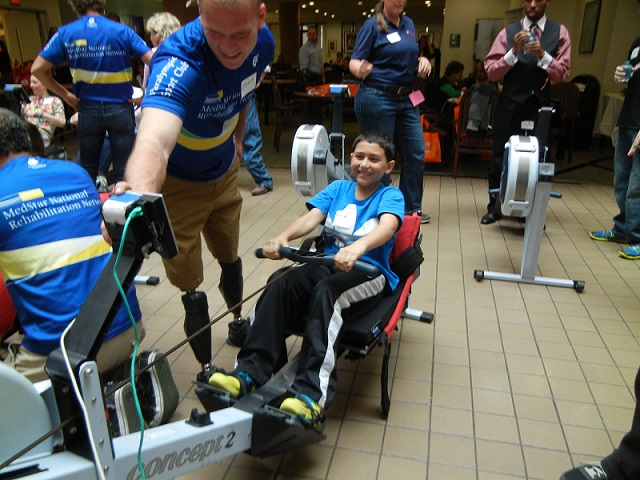
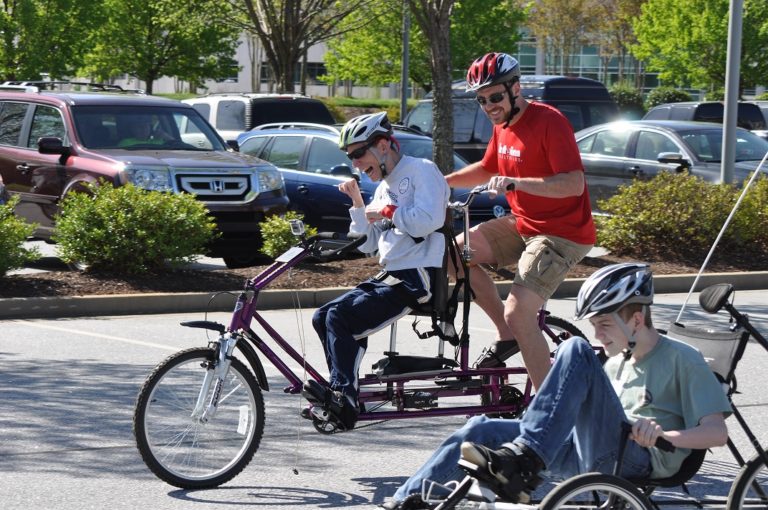
First Cycle
First Cycle introduces the prosthetic and/or orthotic user to the thrill of cycling. Participants will be taught the necessary skills of mounting and dismounting, braking, shifting gears, peddling and safety. Volunteers will be paired with participants as they begin pedaling on a bike trainer and gain confidence with their seated balance. Once ready, participants will be guided through a contained environment with volunteers by their side to guide steering, turning, and assist with balance. Helmets are mandatory for First Cycle, as safety is the ultimate priority. First Cycle aims to improve participants’ balance, proprioception, cardiovascular endurance, strength, and mental wellbeing.
First Ohm
First Ohm aims to introduce those with physical and mobility challenges to the art of yoga. Yoga participants will be taught the basics for posture-based physical fitness, stress-relief, and relaxation techniques, along with adaptations for each pose as necessary utilizing items like mats, pillows, chairs, and bands/straps and proper breathing techniques. Each class will focus on individual’s needs, as not to rush any participant during their participation. We understand that body positioning is as unique as each person’s body and their abilities and that each exercise will be adapted for each participant’s specific needs with the assistance of our qualified instructor(s).
